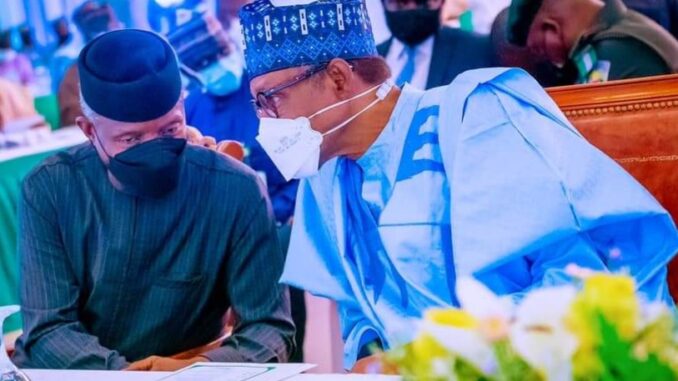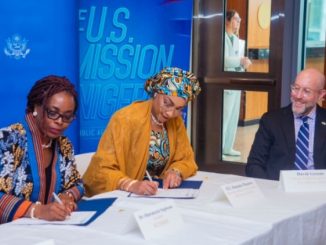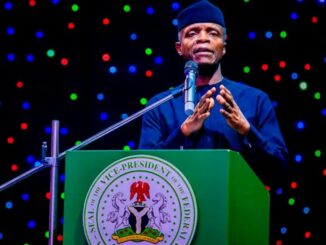
• President tasks ministers on project delivery
• Directs SGF to convene quarterly coordination meetings on nine priority areas
President Muhammadu Buhari has pulled his weight behind the Vice President Yemi Osinbajo’s call on the Central Bank of Nigeria (CBN), to synergize between other fiscal and monetary authorities, and to review its strategy on foreign exchange to ensure that the Naira value reflects the market reality.
Corroborating his Vice President, the President, also, on Tuesday in Abuja, stressed the need for synergy between the fiscal and monetary authorities in the country to keep the economy on the trajectory of growth, just as he directed cabinet ministers and permanent secretaries to redouble their efforts and work in synergy toward total delivery of this Administration’s set target to improve livelihood of all Nigerians.
The President, who gave the directive at the end of the two-day Mid-term Ministerial performance review retreat, also instructed the ministers to ‘‘ramp up implementation’’ of their mandates along the Nine Priority Areas of this Administration.
The Vice President, had earlier on Monday, at the retreat, delivering his progress report on the Economic Sustainability Plan (ESP) implementation, urged CBN, to review its foreign exchange management strategy and ensure that the Naira’s valuation reflects market reality, while also charging country’s apex financial institution to rethink its demand management policy, which it has used to restrict imports in an attempt to manage pressure on the currency.
“I think we need to move our rates to be as reflective of the market as possible. This is the only way to improve supply (of Dollars),” the Vice President said.
Osinbajo, who noted that, currently, the Naira is changing at N411 to $1 US Dollar at the official side of the market, while the same goes for about N565 at the parallel market, said, “We can’t get new Dollars into the system, where the exchange rate is artificially low.”
He also called on the CBN to synergize on fiscal, monetary policies between relevant government ministries and officials rather than deterring investors from bringing foreign exchange into the country.
“As for the exchange rate, I think we need to move our rates to be as reflective of the market as possible. This, in my own respectful view, is the only way to improve supply.
“We can’t get new dollars into the system, where the exchange rate is artificially low. And everyone knows by how much our reserves can grow. I’m convinced that the demand management strategy currently being adopted by the CBN needs a rethink, and that is my view.
“There must be synergy between the fiscal and the monetary authority. We must be able to deal with the synergy, we must handle the synergy between the monetary authority, the CBN, and the fiscal side,” Osinbajo said.
Meanwhile, as he wrapped up the retreat on Tuesday, President Buhari noted that intensive discussions at the retreat provided an opportunity to reflect on what this administration has done and areas it needs to improve and refocus attention.
‘‘The retreat provided an opportunity for us to undertake an objective assessment of our stewardship in line with the contract we signed with the Nigerian people to deliver on our electoral promises.
ALSO READ: Osinbajo to CBN: Review forex management strategy, synergy on fiscal, monetary policies
‘‘From the assessment report and discussions at this retreat, I am glad to note that progress has been made towards the achievement of our objectives.
‘‘The independent performance assessment report presented on day one of the retreat, indicates that significant progress has been achieved in the delivery of the Ministerial Mandates.
‘‘Distinguished participants, the discussions at the retreat have prompted the need for us to ramp up implementation on the deliverables.
‘‘We must close the gaps in our implementation efforts to ensure that we attain set targets by 2023,’’ the President said.
To achieve this, President Buhari, therefore, directed the Office of the Secretary to the Government of the Federation (SGF) to immediately begin the process of convening quarterly coordination meetings for each priority area based on the collaborative results framework.
He explained that the aim of these meetings is to ascertain status of implementation across the nine priority areas, identify bottlenecks, and proffer immediate solutions.
‘‘All Ministers and Permanent Secretaries must be in attendance. These are not meetings to delegate,’’ he said.
Further, the President instructed the Office of the SGF to immediately commence engagement with stakeholders to agree and push forward a framework for the institutionalization of the Central Delivery Coordinating Unit.
‘‘All Ministers and Permanent Secretaries are to promote a robust performance culture across the Ministries, Department and Agencies (MDAs) by setting up intra-ministerial delivery task teams,” he said.
Similarly, the President directed the Head of Service to, as a matter of urgency, invest in capacity strengthening of the Planning, Research and Statistics departments in all MDAs.
‘‘This should be done in collaboration with the Central Delivery Coordinating Unit,’’ he said.
Underscoring the need for synergy between the fiscal and monetary authorities, the President assured Nigerians that this Administration will continue to implement fiscal measures to improve domestic revenues and mobilize external funding support to build a more resilient economy.
President Buhari pledged that issues around expanding access to quality education, affordable healthcare and productivity of Nigerians will be given priority attention within the period of this administration.
‘‘We will sustain all on-going efforts in rebuilding our health system through targeted investment in the health sector, especially our vaccination drive to halt the spread of the Coronavirus pandemic.
‘‘This Administration remains committed to providing the education and training required for employment and entrepreneurship, particularly using technology to impact the relevant skills on our youths.
‘‘Our Social Investment Programmes will be sustained in the coming years.
‘‘We will continue to reach out to the poorest and most vulnerable households through the National Cash Transfer Programme and other initiatives of Government,’’ he said.
According to the President, the Ministry of Humanitarian Affairs, Disaster Management and Social Development has been directed to come up with a legislative framework for social protection that also guarantees its funding stream.
He added that in view of the critical role of Micro, Small and Medium Enterprises in economic growth and development, efforts will be geared towards removing all bottlenecks that militate against access to government support schemes by SMEs.
‘‘Government will adopt a holistic approach to industrialization that is aligned with Nigeria’s aspirations and requirements, working closely with key stakeholders in the private sector. We will continue to support SMEs in view of their multiplier effect on the economy,” he said.
On the National Single Window Project, the President also directed the Minister of Finance, Budget and National Planning to ensure all relevant MDAs involved in the implementation of the project complete all processes needed for effective take-off of the National Single Window platform by first quarter of 2022.
The President also spoke on the administration’s determination to build systems to fight corruption and improve governance, saying:
‘‘We will continue to address the issues that foster corruption and impair transparency in the management of public resources. Efforts will be geared towards improving coordination and synergy between anti-corruption agencies.’’
On infrastructure, the President promised that the Federal Government will prioritize funding and ensure that all high-priority ongoing infrastructure projects are completed before the end of this Administration.
He announced that the Presidential Infrastructure Development Fund would continue to support the delivery of legacy infrastructure projects across the country.
On his assessment of the retreat, the President said:
‘‘I am confident that the lessons we have learned in the last two years of implementing our policies, programmes and projects will serve as the needed tool to propel every Ministry to remain committed, towards the achievement of our developmental objectives.”
The President commended the SGF, Boss Mustapha, and his team for successfully organizing the retreat, as well as the resource persons that added immense value to the process.
The Nine Priority areas set out by the administration include: building a thriving and sustainable economy, enhancing social inclusion and poverty reduction; enlarging agricultural output for food security and export as well as attaining energy sufficiency in power and petroleum products.
Others are expanding transport and other infrastructural development, business growth, entrepreneurship and industrialization; access to quality education, affordable healthcare and productivity of Nigerians.
The administration has also prioritised building a system to fight corruption, improve governance and create social cohesion as well as security for all.




